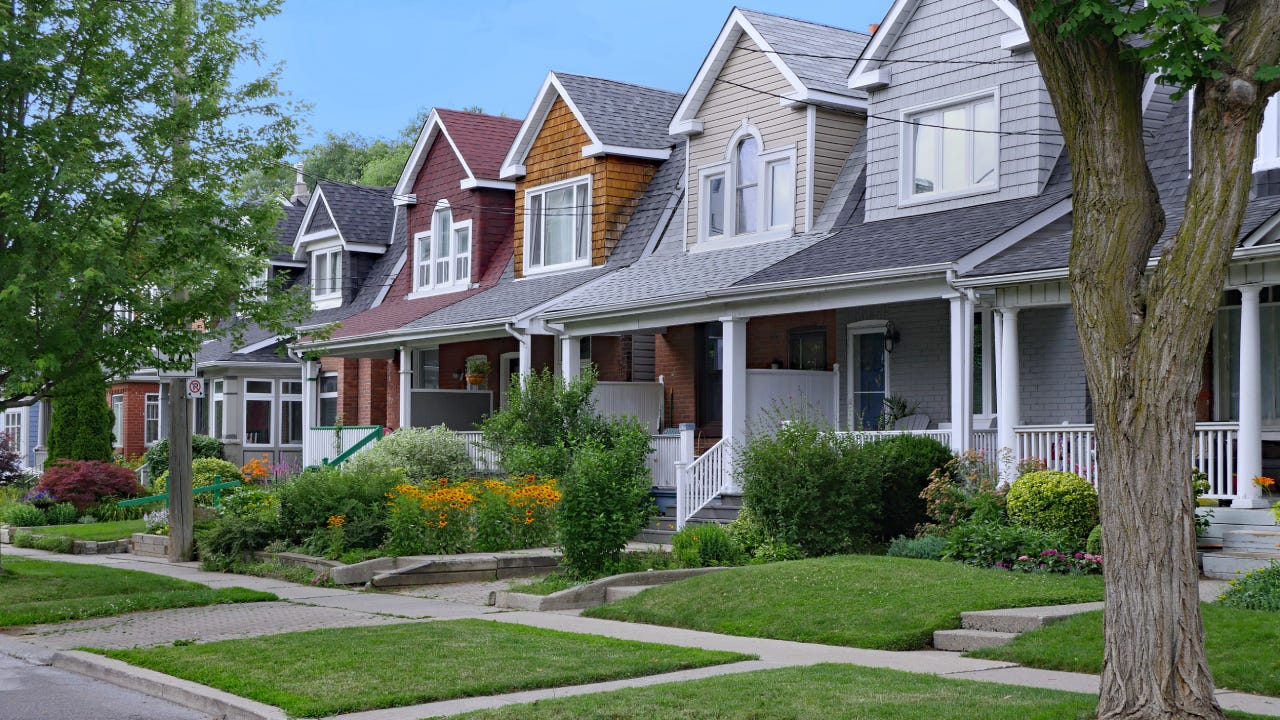How much house can I afford if I make $60,000 a year?

If you’re bringing home $60,000 each year, it might feel impossible to actually buy a home. A $60K salary is around $14,000 less than the median household income in the country — $74,580, per the most recent Census data — which falls in the bottom half of earners. And at the same time, housing prices and mortgage rates seem to be getting higher and higher.
However, homeownership is not necessarily out of your reach. In fact, a $60,000 annual income may even make you eligible for financial assistance programs created to help make the cost of homebuying less overwhelming. Read on to understand what kind of house you can afford on a $60K salary.
The 28/36 rule
The 28/36 rule is a framework to help you avoid stretching your budget too thin — many lenders follow it when assessing mortgage applications. Using this as a guide, you should avoid spending more than 28 percent of your monthly income on your housing payment, and you should try to cap your entire debt load — not just housing costs but also credit card, car and student loan payments — at 36 percent of your earnings.
Here’s a simple look at how the 28/36 rule applies to your $60K salary:
- $60,000/12 = $5,000 per month
- $5,000 x 0.28 = $1,400 (your target maximum for a monthly mortgage payment)
- $5,000 x 0.36 = $1,800 (your target maximum for your entire debt obligations)
However, figuring out how much you can spend on a house isn’t just about a few numbers. A lender is going to take a look at your entire financial picture to determine what you can afford. And keep in mind that the $1,400 monthly mortgage cost does not include a down payment and closing costs, which must be paid upfront.
How much house can you afford?
With the 28/36 rule as your North Star, you should aim to spend no more than $1,400 on your monthly mortgage payment. What kind of a house will that get you? Let’s say you qualify for a 30-year loan with a 7.5 interest rate. Based on Bankrate’s mortgage calculator, you should look for a home that costs $200,000.
If you can afford a 20 percent down payment — $40,000 — your monthly principal and interest payment for that size mortgage loan will be $1,118. That gives you a bit of a cushion to build in the extra costs for property taxes and homeowners insurance, which are both part of that monthly housing cost and which vary widely depending on your location.
However, you’ll be in better shape if you don’t max out that $1,400 cap. You don’t want to be house-poor: Keeping your payment a bit lower will help you account for everyday expenses like utilities, food, transportation and all the other factors that make up your total cost of living.
Here are some other things to keep in mind when figuring out how much house you can afford:
Your credit score
Your credit score plays a key role in your house-hunting budget. The higher your score is, the lower your mortgage rate will likely be — which translates to less interest and a lower monthly payment. While it’s possible to get a mortgage with a relatively low credit score, a low score will deem you a high-risk borrower, which means the lender will probably charge you a significant premium. Work to bring your credit score up as high as you can before applying for a mortgage loan.
Your down payment amount
Saving for a down payment is hard — 20 percent down on a $200,000 home is $40,000, which can feel like an insurmountable sum on a $60K salary. Contrary to popular belief, though, you don’t have to put 20 percent down to buy a home. Some conventional lenders require a down payment of just 3 percent of the purchase price, and FHA loans require just 3.5 percent if your credit score is at least 580.
However, an upfront contribution of less than 20 percent means you have to borrow more. It also means you’ll have to pay for private mortgage insurance, which will add to your monthly payment at a time when you’re trying to save. If family help is a possibility, you may be able to cover part of your down payment with gift funds from a parent or relative.
Your location
Your $60,000 salary goes a lot further in some markets than others, so where you’re hoping to live makes a particularly big difference here. A $200,000 price point makes for a challenging house-hunt these days, given that the nationwide median home price, according to the National Association of Realtors, is more than $400,000.
But don’t let that discourage you: There are still plenty of affordable housing markets in the country. Be sure to cast a wide net to see where you can stretch your income as far as possible. And if you can’t make the math work on a single-family home in your desired area, consider a condo or townhouse, which will likely be significantly cheaper.
Home financing options
Just as there are loads of different kinds of homes to buy, there are many options to come up with the money you need to make one of them your own.
Different types of loans
Here’s a rundown of the most common types you’ll come across:
- Conventional loans: Conventional loans require a minimum credit score of 620, but 740 and above will get you the best terms.
- FHA loans: Your $60K salary may see you leaning toward this option — government-guaranteed FHA loans are appealing to borrowers with lower income and lower credit scores. If you qualify, a score of 580 or above requires just a 3.5 percent down payment, while a score of 500 to 579 requires 10 perent down.
- USDA loans: You’ll need to qualify as a low- or moderate-income buyer for a USDA loan — which your $60K salary may well help you do. They’re only for buyers in qualifying rural areas, though, so if you’re looking in a city they’re not an option for you.
- VA loans: If you are a current military service member or a veteran, you may qualify for a zero-down-payment VA loan.
First-time homebuyer programs
The first time buying a home tends to be the most difficult: You aren’t selling a previous home, so you have no sale proceeds to put toward a down payment. However, this is an area where your $60K salary can be especially useful: It may make you eligible for any number of down payment assistance programs designed to ease the upfront expense of homebuying. These can come in the form of grants, low-interest loans or forgivable loans that help you cover down payment and closing costs.
Get preapproved for a mortgage
Regardless of where you want to live or how much you can contribute to a down payment, there is one essential thing you need to do: Get preapproved for a mortgage. This will give you a clear picture of how much a lender is likely to let you borrow, which gives you a solid budget to stay within. Remember, though, the key word is “likely” — after a preapproval, you’ll still need to apply officially.
How to get started
On a $60,000 salary, your list of buying options is likely to be limited. So it’s essential to work with a local real estate agent who knows your market well. A savvy agent can help you find neighborhoods and listings that meet your budget, and can also guide you through the most cost-efficient homebuying path possible.
Why we ask for feedback Your feedback helps us improve our content and services. It takes less than a minute to complete.
Your responses are anonymous and will only be used for improving our website.






